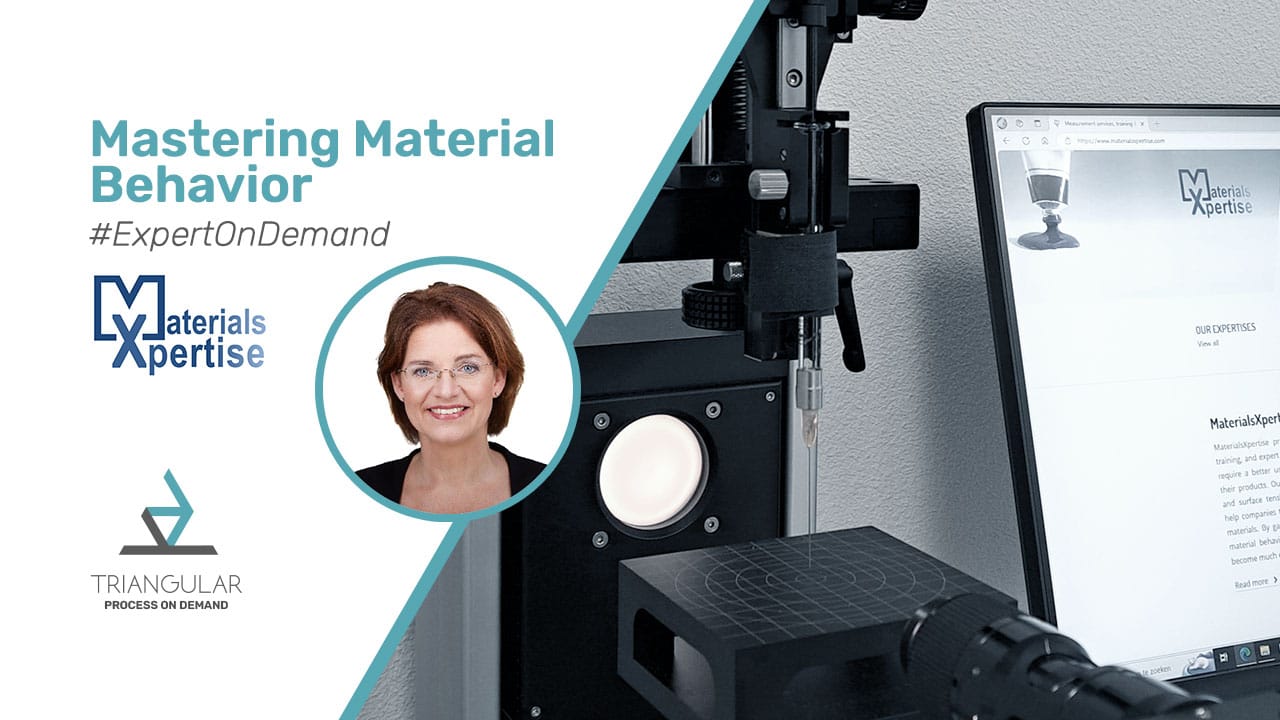Mariëlle, could you please share with us the background and motivation behind the foundation of MaterialsXpertise in 2016? What drove you to establish a company focused on rheology and surface tension?
Mariëlle: MaterialsXpertise was founded in 2016 after being at TNO (Netherlands Organisation for Applied Scientific Research) for over 15 years in various roles. After publishing my freelance availability on LinkedIn a direct assignment popped up within 24 hours. So MaterialsXpertise was started (as you need a company and VAT number), at that time without any equipment or lab. With this first assignment in the field of rheology our first rheometer was bought and in time the lab grew with a contact angle goniometer and much more in due time.
During my career at TNO I was responsible a laboratory and projects where rheology and interfacial interactions were studied. Both rheology and interfacial interactions were the red thread through most of the projects performed – so it was a logical step to build MaterialsXpertise in this field of expertise.
Rheology and interfacial interactions play an important role in all kinds of processes, from your day-to-day routines, from squeezing toothpaste onto your toothbrush to high end industrial processes such as ultra clean wafer processing.
Your expertise encompasses a wide range of areas including polymer technology, coatings, surface modification, and interactions at the interface.
How do these specialties contribute to the services offered by MaterialsXpertise, particularly in industries such as coatings, adhesives, and food?
Mariëlle: During my career at Eindhoven University of Technology, TNO and MaterialsXpertise I have developed various competences in a broad range of product-market combinations, and levels of scientific depth.
This differentiates and strengthens the position of MaterialsXpertise and is a profound basis in understanding of the product-process-performance triangle.
The equipment we invest in, and we use at our cooperation partners, is dedicated to the application area of the client.
The red thread throughout our projects is rheology and interfacial interaction. This is rather broad and applicable in a large area. We have projects in the field of pre-R&D in pharma as well as projects in construction, it is too broad to pinpoint it in a single sentence.
An easy to visualize application for all readers is the area of coatings. The ingredients that build the coating formulation determine the functionality of the coating i.e. protective, functional like water repelling. The composition of the coating formulation also determines the processability after application. Is a solvent present that needs to be absorbed by a substrate or evaporated, is thermal or UV curing needed? And the composition also determines how the coating can be applied - brush, roller, spray, curtain, slot-die, etc.
Rheological behavior determines ‘how thick’ a coating is, how easy to apply, will it drip or not, how long will it take to harden, will it be a hard coating, or will it soften at elevated temperature, etc.
The interfacial interaction will tell how well it spreads on a substrate, and will it adhere to the substrate. A combination of the rheological behavior and the interfacial interaction will tell whether it will level to a smooth surface finish without artifacts – e. g. pinholes or orange peel effects.
So, this example clarifies the options we have at MaterialsXpertise in one ‘simple’ example.
Could you elaborate on the services provided by MaterialsXpertise, such as sample analysis, research support, training, and expert advice?
How do these services assist companies in better understanding their product behavior and optimizing their formulations?
Mariëlle: At MaterialsXpertise we have access to various analytical tools in our own lab, and at our cooperation partners. We are aiming to be an ‘one-stop-shop’ to gain knowledge about the product-process-performance triangle.
As it is in our DNA to share the knowledge built, we can support research and development trajectories of our customers.
We are the experts in the field of rheology and interfacial interactions – key performance indicators for proper processability and performance.
Most of our customers buy ingredients and formulate themselves, so we can help them gain insight into the effect of composition on processability and/or performance.
Other customers are at the point of constructing a new process or upscaling, at that point the properties of the fluids or gels are important to know to make a proper choice for pipe diameter, pump dimensions, etc.
About the training part – as knowledge not shared is knowledge lost – we train new employees at the customers site in case the knowledge is lost after a former colleague has left the company and the instrument is still there, but knowledge and hands-on experience is lost.
We look for synergy and cooperation and are not satisfied by providing data only. We always check whether the outcome of the project is understood well and can be implemented at the customer’s site.
Could you discuss the significance of structure-property relations in material performance and the role of dedicated equipment and measuring protocols in material characterization?
How does MaterialsXpertise ensure the use of appropriate methodologies to unravel these relations for clients?
Mariëlle: Structure-property relations provide valuable information on the performance of materials, just like ‘tuning’ or ‘turning knobs’ your radio for optimal receipt.
By using dedicated analyses, and the combination of various analyses, the pieces of the puzzle become clearer, and the picture of material performance can be completed.
Depending on changes in formulation composition and process settings such as temperature and pressure, we can apply or develop the most effective measurement protocol.
One of the keys to success is an open communication with the client, as the knowledge about the process – this is always done under NDA.
Another crucial factor for success is collaborating with potential third parties when we lack specific analytical tools in-house. We engage with equipment suppliers and maintain connections with external laboratories where we can conduct analyses internally, ensuring confidentiality and quality control. If an analysis requires expertise we don't possess, we prioritize transparent communication with project partners, seeking their approval before proceeding.
In your experience, what are some common challenges companies face in characterizing their materials, and how does MaterialsXpertise assist in overcoming these challenges?
Could you provide examples of how your consultancy has helped clients optimize their product behavior and improve performance through better understanding of material behavior?
Mariëlle: Depending on the application area, our customers encounter a multitude of challenges. These range from issues related to new ingredients affecting material behavior, such as processability and storage stability to ensuring the ultimate performance of the product.
Given the broad nature of our client base, ranging from low viscous liquids to solids, it's challenging to pinpoint generalities. However, one illustrative project involved a product comprised of various laminated and glued components. This product faced unexplained failure, necessitating intervention. Through the project, we identified that the surface treatment of one foil component was unnecessary, leading to delamination and moisture-related issues. Omitting this treatment not only enhanced the product's robustness but also generated significant cost savings.
Another typical example showcases our extensive expertise in density, interfacial interaction, and rheology. We assisted a customer in designing optimal processing conditions through Computational Fluid Dynamics (CFD) modeling, requiring only small material quantities for property analysis. Subsequently, a dedicated model was employed to optimize process settings, such as feed rate. This approach facilitated faster screening without sacrificing precious materials. Prior to this, optimization was conducted through time-consuming trial and error, resulting in unnecessary material loss.
What would you consider to be one of your most rewarding or impactful projects at MaterialsXpertise?
Could you share a bit about the project and why it stands out to you as a significant achievement?
Mariëlle: One of our most impactful projects involved collaboration with a customer and their corporate R&D headquarters abroad, supported by two of our equipment suppliers who went above and beyond the state of the art of the technique used. After successfully securing funding for the project, we conducted a comprehensive analysis that yielded valuable insights into the effects of formulation and modification on the customer's product behavior in their application.
Upon project completion, our report was adapted into a PhD project proposal, reflecting the significant knowledge accumulation deserving further fundamental research. The new insights gained from certain types of analyses, developed in collaboration with the equipment supplier, proved valuable for both MaterialsXpertise and the supplier.
Ultimately, the customer was able to enhance their laboratory capabilities by investing in additional equipment, enabling them to perform quality control and development tasks previously outsourced to us.
This project exemplifies our strengths in cooperation, knowledge transfer, and mutual success for all parties involved, and I am exceptionally proud of our contributions to this achievement.
Can you provide insights into some of the projects you are currently working on at MaterialsXpertise?
I understand that confidentiality might be a factor, so please share within the bounds of what you can disclose.
Mariëlle: Currently, we're engaged in a diverse range of projects, albeit with confidentiality constraints limiting our ability to share detailed results. In general, our work spans the entire knowledge chain, encompassing ingredients, formulations, miscibility, solubility, stability studies, processability, and product performance. Our capabilities extend across a broad spectrum, from low-viscosity formulations to powders and everything in between.
One ongoing project focuses on addressing adhesion challenges in high-speed coating applications. We're investigating both substrate and coating formulations to identify areas for improvement. This project employs various analytical techniques, including adhesion probability mapping and viscosity measurements.
In another project, we're examining powder processability to determine the optimal production method and predict caking during long-term storage, with a focus on prevention.
Additionally, we're involved in a project centered around emulsions. This project entails creating the emulsion, evaluating dynamic interfacial tension and viscosity, assessing stability over time, and analyzing the ultimate properties of the product generated through a dedicated and proprietary process.
Thank you Mariëlle Wouters for the deep insight into your work and area of expertise.

Dr.ir. Mariëlle Wouters
Founder and managing director of MaterialsXpertise. As an experienced materials technologist (MaterialsXpert) she is active in a large range of application areas –or – product-market combinations.
She founded MaterialsXpertise in 2016. Previously, she had spent over 15 years working at TNO, a national research institute in the Netherlands.
At MaterialsXpertise she provides support to national and international companies, assisting them in understanding their product's behavior concerning processability and performance. Her clients range from small startups to large multinational corporations with their own R&D departments. Her goal is to facilitate synergy between the challenges encountered by the company (such as customer inquiries), the available knowledge, and insights gained through dedicated analyses.
Get in touch with Mariëlle.

